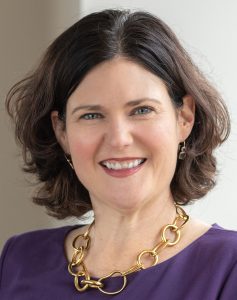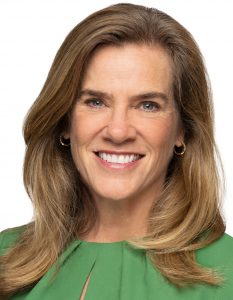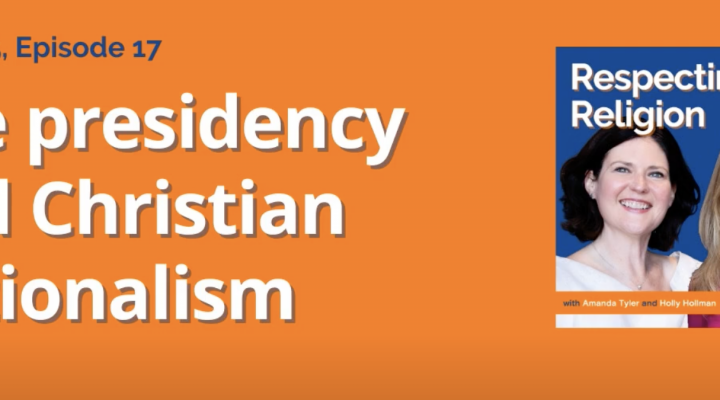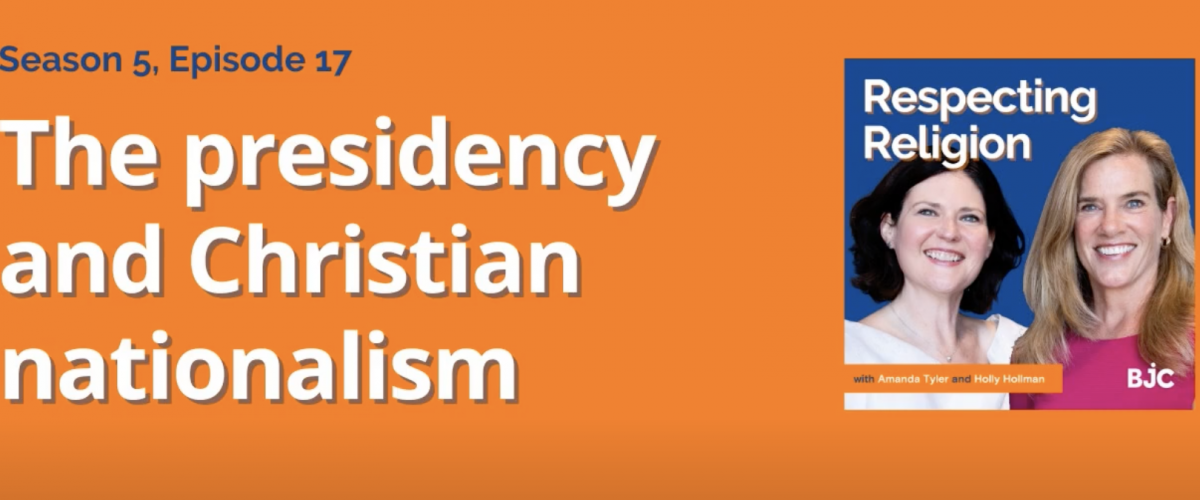Christian nationalists started building the myth of America as a white Christian nation barely a generation after the country’s founders championed religious freedom and diversity, according to Amanda Tyler, executive director of Baptist Joint Committee for Religious Liberty.
Then as now, white Christian nationalists ignored the Constitution’s glaring omission of Christianity, God or Jesus Christ from its original wording or amendments, as well as the letters and speeches of framers warning against religious favoritism on the part of government, Tyler said during the Feb. 21 episode of BJC’s “Respecting Religion” podcast.

Amanda Tyler
The nation’s first president became a leading target in early campaigns to Christianize American history after his death in 1799, she said. “They turned George Washington into a Moses figure and used language that explicitly linked God’s providential hand into the founding of the country and infused this religious significance into other secular figures after their deaths.”
In reality, Washington had spoken “a lot about religious freedom, and he was very careful in his public remarks about being inclusive in the way he talked about religion in the public square,” Tyler said.
She and BJC General Counsel Holly Hollman delved into efforts to convert American history, its presidents and other leaders into proponents of white supremacy and Christian nationalism.
“We see a lot of armchair historians out there who like to cherry pick quotes from history to buttress their preferred idea, particularly that the United States was founded to be a Christian nation in some legal sense,” Hollman said. “We know history is complex and can teach us a lot. We appreciate the serious, well-trained historians and teachers who remind us of that. But so many of those who use history to promote Christian nationalism leave out some obvious counterevidence.”

Holly Hollman
One historian who has uncovered the workings of Christian nationalism is Anthea Butler, author of White Evangelical Racism: The Politics of Morality in America and chair of religious studies at the University of Pennsylvania, Tyler said.
“She called the America-as-a-Christian-nation idea a ‘trope of exclusion.’ I really thought that was an excellent way to describe it because, as she says, it centers American history on white Anglo-Saxon Protestants as the ones who are willing and should be running the country, both then and now. And that’s really one of the best summations of the danger of Christian-nation mythology.”
While that ideology may initially seem innocuous, its assumptions and messaging are dangerous to anyone in the country who doesn’t fit into its narrow racial and religious definitions, she said.
Still, some practices around the time of America’s founding have contributed to the misconception of America as a historically Christian nation. Tyler cited the 1790 U.S. Census as an example.
“It didn’t take into account the religiosity of the enslaved population, which had a lot of religious pluralism in it. And it also was taken at a time right after the Colonial period when we had established religion. It could be estimated of those who were counted, up to 98% were white Protestants. People didn’t have much of a choice about whether they were going to belong to the majority tradition or not.”
“In their more limited version of freedom, they said no to religious tests for public office and did not establish a Christian nation.”
But white supremacy plagued the nation from the beginning, she said. “Their vision was very limited in many ways by their racism. They continued to make slavery legal. So, we know freedom was not the kind of expansive freedom we yearn for today. And yet in their more limited version of freedom, they said no to religious tests for public office and did not establish a Christian nation.”
Presidents throughout U.S. history have been clear about the importance of maintaining the separation of government and religion, Hollman said.
Jefferson was adamant that government have no place or power over religious exercise or discipline and that “to practice one’s religious discipline is a decision between them and their God and not something that the government can dictate because, as President James Madison would say, religion flourishes in greater purity without the aid of government,” she explained.
Tyler cited President Lyndon B. Johnson’s devotion to upholding the separation of church and state as laid out in the Constitution.
Such historical knowledge “really undercuts this idea that we have been or should be a Christian nation moving ahead in time,” she said. “We hear even stronger language protecting the separation of church from that Baptist president, Jimmy Carter, who spoke often about his own Christianity, his own Baptist faith and his appreciation for religious freedom for all.”
Tyler said her forthcoming book, How to End Christian Nationalism, will present a lot of this history and will help demonstrate that if the founders wanted to establish an officially Christian nation, they would have done so.
“My favorite way to counter the Christian nation myth is to say, ‘Let’s go to the text. Let’s go to the text of the Constitution itself, the original Constitution where Christian and Christianity are not at all mentioned. God is not mentioned, Jesus is not mentioned.”


